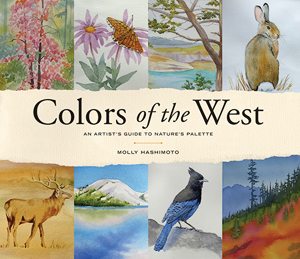Though I’ve not yet met her, I’ve found Molly Hashimoto a delightful travel companion. I see her dreamy watercolors and vibrant block prints at a couple places I frequent in the Pacific Northwest—the Seward Park Audubon Center and the North Cascades Institute. Just more than a week ago, in the gift shop of the New Mexico History Museum in Santa Fe, I instinctively picked up a box of cards and, hello, they were Hashimoto’s Western tanager in front of Eldorado Peak in North Cascades National Park.
Coincidently, I’d brought Hashimoto’s book, “Colors of the West: An Artist’s Guide to Nature’s Palette,” with me to Santa Fe. In the Orange chapter (chapters are arranged by colors found in nature out West), I found out that she’d been to the last two public lands I’d visited—Bandelier National Monument in New Mexico and Yellowstone National Park in Wyoming and Montana. In fact, in the Gold chapter, she even did a treatment of Yellowstone’s North entrance, where I’d stayed a couple of nights.
Speaking of gold, you’ll discover plenty of it in her book, one of the most clever, multi-layered works on art and public lands since QT Luong’s “Treasured Lands,” which I reviewed at this time last year. Luong and I share photography as a platform, though I’ve studied landscape artists such as Thomas Moran and Chiura Obata, both of whom Hashimoto profiles in her book.
“Colors of the West” is part art book, part instructional, part travelogue—however you get your inspiration on trails or easel, you’ll find it here. As mentioned, Hashimoto’s book is divided into chapters representing colors found in nature out West: green, blue, gold, red, orange and violet. She discusses how the colors are found and produced in various public lands, several of which are discussed in mini-profiles per chapter. Every chapter also includes Artist Heroes profiles and breakouts on technique.
Even if you are not a painter, you’ll still want to read the technique sections, and not just because Hashimoto has an extensive teaching background as places such as the North Cascades and Yellowstone Forever Institutes. To wit, discussing “Wet-into-Wet,” in the red chapter, Hashimoto writes, “In early September, after checking out the Mount Rainier National Park webcam’s Paradise page and seeing spectacular virtual fall color, I knew I had to drive down to see it.”
This is one of several head-slapping passages in “Colors of the West,” where you’ll say to yourself, “C’mon, you mean there are other national park nerds who get inspired to visit by checking out webcams?!”
Like Luong, Hashimoto is a world-class artist who makes her art accessible through her book. She’s like your quirky friend who will hike up that ridge with you, but she’s just going to haul some paint, brushes and maybe a canvas with her. As such, I wish there were a more portable version of “Colors of the West”—Kindle or, like Luong did with “Treasured Lands,” a PDF version for those who purchase the hardcover. I’ve decided I want to keep her around on my artistic, public-lands adventures.




